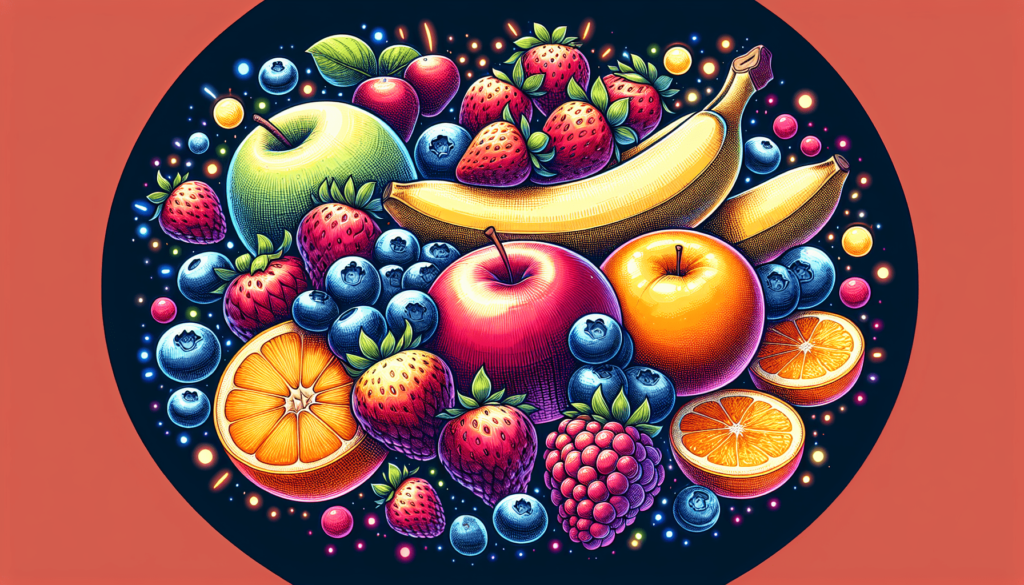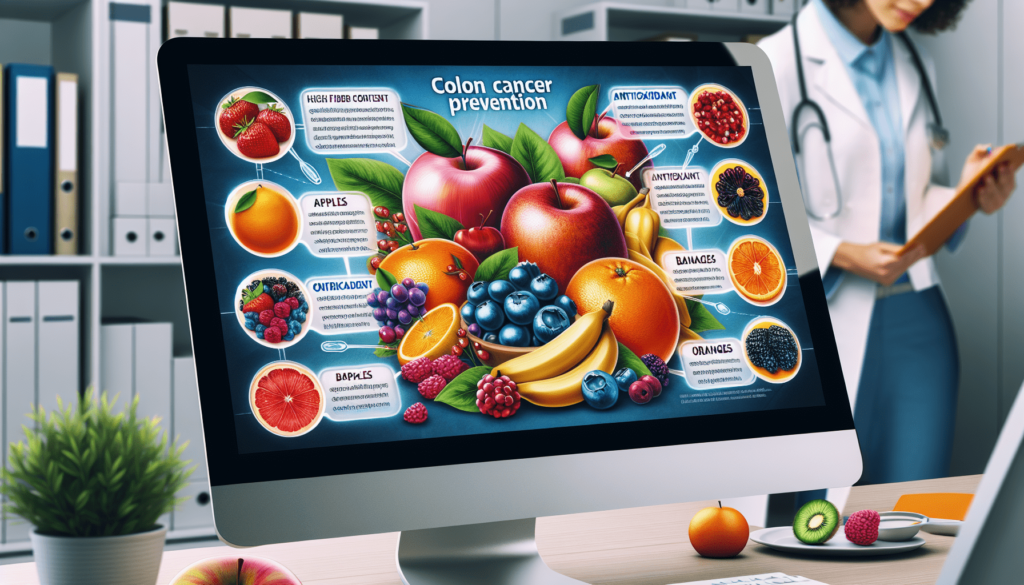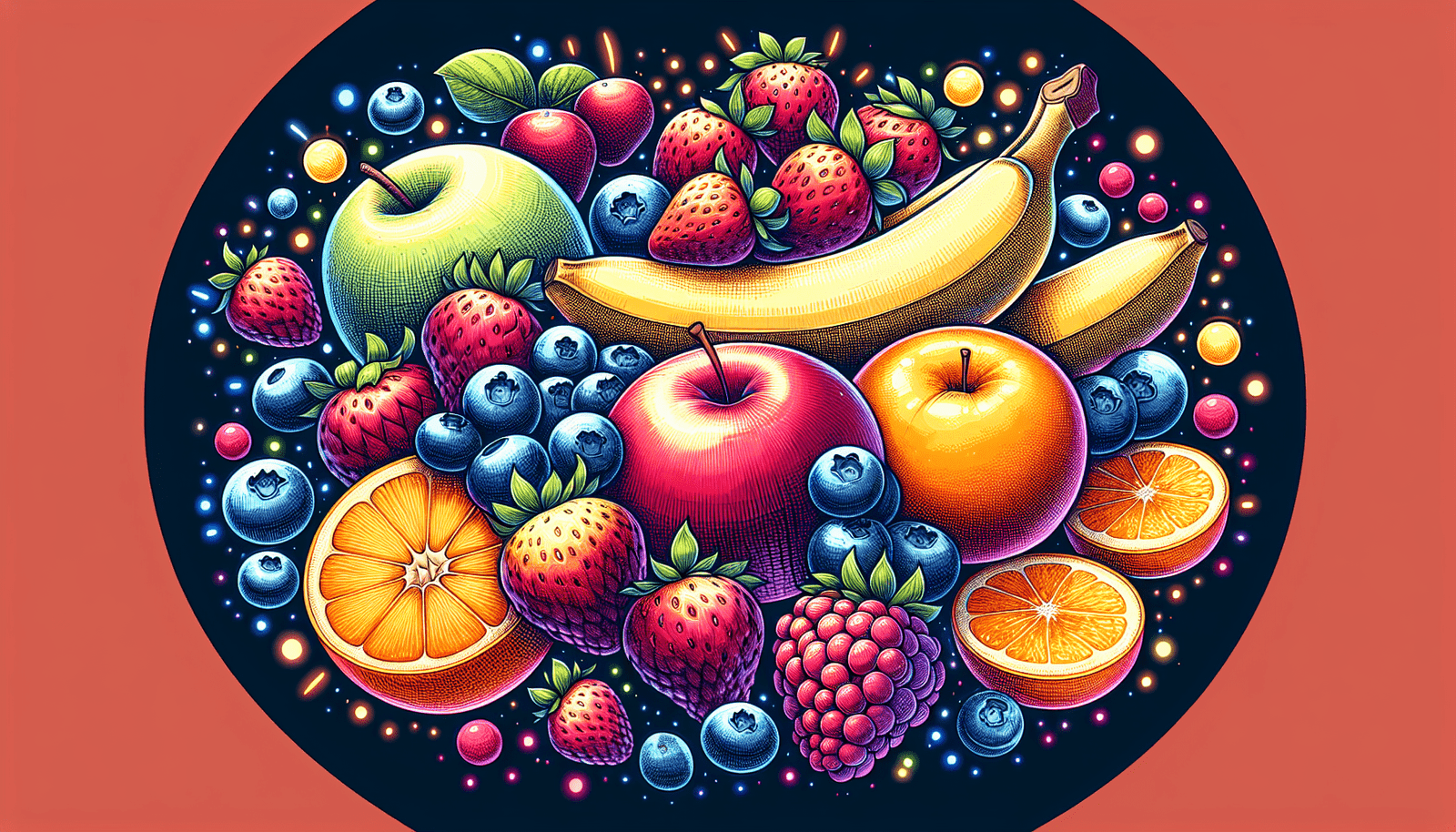Have you ever wondered how something as simple as including fruits in your diet could have a significant impact on the prevention of colon cancer? Fruits are not only delicious and nutritious but also have a treasure trove of benefits to offer. From their high fiber content to their abundance of antioxidants and phytochemicals, fruits play a crucial role in maintaining a healthy digestive system and reducing the risk of colon cancer. So, let’s explore how incorporating these colorful wonders into your daily meals can help safeguard your colon health.
High in Fiber
Fruits are known for their high fiber content, and this is one of the key reasons why they are beneficial in the prevention of colon cancer. Dietary fiber plays a crucial role in regulating bowel movements, ensuring that waste passes through the digestive system efficiently. By promoting regular bowel movements, fruits help to reduce the risk of colon cancer.
A diet rich in fiber has been shown to lower the risk of developing colon cancer. This is because fiber helps to keep the colon healthy and functioning properly. It adds bulk to the stool, making it easier to pass, and prevents constipation. When waste sits in the colon for extended periods of time, harmful substances can be reabsorbed into the body. By promoting regular bowel movements, fruits help to ensure that waste is efficiently eliminated, reducing the risk of colon cancer.
Abundance of Antioxidants
Another important way in which fruits contribute to the prevention of colon cancer is through their abundance of antioxidants. Antioxidants are compounds that help to neutralize free radicals in the body. Free radicals are highly reactive molecules that can cause DNA damage and contribute to the development of cancer.
By consuming fruits that are rich in antioxidants, you can provide your body with the necessary tools to combat these harmful free radicals. This can help to prevent DNA damage and reduce the risk of colon cancer. Fruits such as berries, citrus fruits, and grapes are particularly high in antioxidants and should be included in your diet regularly.

Rich in Vitamins and Minerals
In addition to their fiber and antioxidant content, fruits are also a great source of vitamins and minerals that have protective effects against colon cancer. Certain vitamins and minerals, such as vitamin C, E, and selenium, have been found to be particularly beneficial in reducing the risk of colon cancer.
Vitamin C is a powerful antioxidant that helps to protect cells from damage, including damage to DNA. This can help to prevent the development of cancer cells. Vitamin E is another antioxidant that works in synergy with vitamin C to fight against free radicals and protect cells. Selenium, on the other hand, is a mineral that supports the immune system and helps to prevent DNA damage.
By including a variety of fruits in your diet, you can ensure that you are getting an ample supply of these important vitamins and minerals. This can help to enhance your body’s defenses against colon cancer.
Anti-inflammatory Properties
Chronic inflammation in the colon has been linked to an increased risk of cancer development, including colon cancer. This is why the anti-inflammatory properties of fruits are particularly significant in the prevention of this type of cancer.
Fruits contain natural compounds that have anti-inflammatory properties, helping to reduce inflammation in the colon. By consuming fruits regularly, you can help to lower the risk of colon cancer by minimizing chronic inflammation.
It is important to note that while fruits can help to reduce inflammation, they should be consumed as part of a balanced diet that includes a variety of other anti-inflammatory foods. By combining fruits with vegetables, whole grains, and healthy fats, you can maximize their anti-inflammatory benefits and contribute to a lower risk of colon cancer.

Polyphenols and Phytochemicals
Polyphenols and phytochemicals are compounds found in fruits that have been shown to have anti-cancer properties. These compounds have the ability to inhibit the growth of cancer cells, including colon cancer cells.
By consuming fruits that are rich in polyphenols and phytochemicals, you can help to protect against the development of colon cancer. Some fruits that are particularly high in these beneficial compounds include apples, berries, and citrus fruits.
Including a variety of fruits in your diet is important to ensure that you are getting a diverse range of polyphenols and phytochemicals. This can help to maximize their protective effects and lower the risk of colon cancer.
Maintaining a Healthy Weight
Maintaining a healthy weight is crucial in reducing the risk of colon cancer, and fruits can play a significant role in weight management. Fruits are low in calories and high in fiber, making them a nutritious and satisfying snacking option.
When trying to maintain a healthy weight, it is important to choose snacks that are nutrient-dense and low in calories. Fruits fit this criteria perfectly, as they provide essential vitamins, minerals, and fiber while being relatively low in calories. Snacking on fruits instead of high-calorie, processed snacks can help to prevent weight gain and reduce the risk of colon cancer.
Incorporating a variety of fruits into your meals and snacks can help you maintain a healthy weight and support your overall health.
Enhancing Gut Health
The health of your gut is crucial for overall well-being, including the health of your colon. Fruits can contribute to enhancing gut health through their content of prebiotic fibers.
Prebiotics are fibers that act as food for the beneficial bacteria in your gut. These bacteria play a vital role in maintaining a healthy gut microbiome, which in turn supports colon health. By consuming fruits that are high in prebiotic fibers, such as bananas, onions, and garlic, you can help to promote the growth of these beneficial bacteria in your gut.
A healthy gut microbiome is essential for protecting against colon cancer, as it helps to maintain a balanced environment in the colon and aids in the elimination of harmful substances. Including a variety of fruits in your diet can contribute to a healthy gut and lower the risk of colon cancer.
Protection Against DNA Damage
Components found in fruits have been found to have protective properties against DNA damage. DNA damage is a known factor in the formation of cancer cells, including those in the colon.
By consuming fruits regularly, you can provide your body with the necessary compounds to protect DNA from damage. This can help to prevent the formation of cancer cells and reduce the risk of colon cancer.
Including a variety of fruits in your diet ensures that you are getting a wide range of these protective components. This can maximize their effects and contribute to the prevention of colon cancer.
Reduction of Colon Inflammation
Inflammation in the colon has been linked to an increased risk of colon cancer. However, certain fruits have been found to have anti-inflammatory effects on the colon, helping to reduce inflammation and lower the risk of colon cancer.
By regularly consuming fruits with anti-inflammatory properties, such as berries and cherries, you can help to reduce colon inflammation and protect against the development of colon cancer.
It is important to note that while fruits can have anti-inflammatory effects, they should be consumed as part of an overall balanced diet that includes other anti-inflammatory foods. By combining fruits with vegetables, whole grains, and healthy fats, you can lower inflammation throughout the body and support colon health.
Combination of Nutrients
Fruits provide a combination of nutrients that work synergistically to prevent colon cancer. The diverse array of vitamins, minerals, antioxidants, and phytochemicals found in fruits all contribute to their protective effects.
By including a variety of fruits in your diet, you can ensure that you are getting a wide range of these important nutrients. This can help to enhance your body’s defenses against colon cancer and support overall health.
In conclusion, fruits are a valuable addition to a cancer-preventive diet, particularly when it comes to colon cancer. Their high fiber content, abundance of antioxidants, rich vitamin and mineral profile, anti-inflammatory properties, polyphenols and phytochemicals, support in maintaining a healthy weight, enhancement of gut health, protection against DNA damage, reduction of colon inflammation, and combination of nutrients all contribute to their effectiveness in preventing colon cancer. By incorporating a variety of fruits into your diet, you can take proactive steps towards reducing your risk of developing colon cancer and promoting overall well-being. So don’t forget to include a rainbow of fruits in your daily meals and snacks for a healthy colon and a healthier you!

